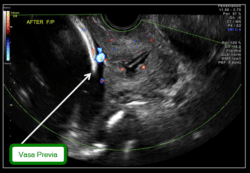DO HORMONAL CONTRACEPTIVES INCREASE THE RISK OF BREAST CANCER?, Nathan Fox, MD (Digital)

A recent study published in the New England Journal of Medicine examined the association between the use of hormonal contraception (oral contraceptives, hormone-releasing IUD’s, hormonal patches, hormone-releasing vaginal rings) and breast cancer. The authors looked at data from 1.8 million women ages 15 to 49 in Denmark, followed on average for 10.9 years. They found
THE DELIVERY OF TWINS, Nathan Fox, MD (Digital)

Many women with twin pregnancies will undergo cesarean delivery. In the US, approximately 75% of all twin births are born via cesarean delivery. However, with the use of breech extraction of the second twin, more twins can be delivered vaginally, and safely. In the setting of a breech (bottom first) or transverse presenting first twin,
VASA PREVIA, Nathan Fox, MD (Digital)

Vasa previa is a rare, but extremely dangerous (to the fetus), condition of pregnancy where a placental blood vessel crosses over the maternal cervix. If not diagnosed, the risk of fetal death is approximately 50%. The blood vessels in the umbilical cord and inner surface of the placenta are all an extension of the fetal
TWIN PREGNANCY IN WOMEN 45 YEARS OR OLDER, Nathan Fox, MD (Digital)

With advances in assisted reproductive technology including In-vitro fertilization (IVF) and egg donation, women are now able to conceive well into their 40’s and 50’s. However, uncertainty exists regarding the safety of these pregnancies for women and their newborns. Additionally, twin pregnancy is a common result of IVF, and all twin pregnancies are higher-risk pregnancies.
VON WILLEBRAND DISEASE, Nathan Fox, MD (Digital)

Von Willebrand Disease (VWD) is a relatively common bleeding disease. With VWD, the Von Willebrand Factor (VWF) is deficient or defective. VWF is a blood glycoprotein involved in hemostasis. There are several subtypes of VWD, based on the exact pathophysiology of the condition (decreased levels of VWF vs. the several ways VWF can be defective).
MULTIPLE SCLEROSIS AND PREGNANCY, Nathan Fox, MD (Digital)

Multiple sclerosis (MS) is an immune-mediated demyelinating disease of the nervous system of unknown etiology, characterized by relapses and remissions of neurologic deficits. In basic terms, MS is a disease where the immune system attacks the protective covering of nerves, leading to symptoms such as vision loss, fatigue, pain, and impaired coordination. Effect of Pregnancy
EPILEPSY AND PREGNANCY, Nathan Fox, MD (Digital)

Pregnant women with epilepsy usually do well throughout the pregnancy. However, there are some concerns for both the mother and the baby that need to be monitored. Frequency of Seizures during Pregnancy For the majority of epileptic women, the frequency of seizures does not increase during pregnancy. Approximately 25 percent of women will show an
THE CAUSES OF REOCCURANT PREGNANCY LOSS, Nathan Fox, MD (Digital)

Recurrent pregnancy loss (RPL) is defined when a woman has two or more consecutive failed pregnancies without a normal pregnancy (for some, it’s defined as three or more). Although more than 50 percent of women will experience sporadic pregnancy loss, only 5 percent of women have RPL. What Causes Recurrent Pregnancy Loss? There are many
THROMBOCYTOPENIA AND PREGNANCY, Nathan Fox, MD (Digital)

What is Thrombocytopenia? Thrombocytopenia is a deficiency of platelets in the blood, defined when the platelet count is less than 150,000. This deficiency occurs in approximately 5 percent of normal pregnancies. Thrombocytopenia may lead to increased bleeding, bruising, or abnormal blood clotting. What causes Thrombocytopenia? The most common causes of thrombocytopenia are lab error (due
SICKLE CELL DISEASE AND PREGNANCY, Nathan Fox, MD (Digital)

Women with sickle cell disease (SCD) are at an increased risk of several complications during pregnancy, both obstetrical and medical. If you have SCD, you will require coordinated multidisciplinary care and close follow-up during pregnancy. In pregnancy, patients with SCD are at an increased risk of thrombosis (blood clots), infections, pulmonary complications, sickle crises, and







